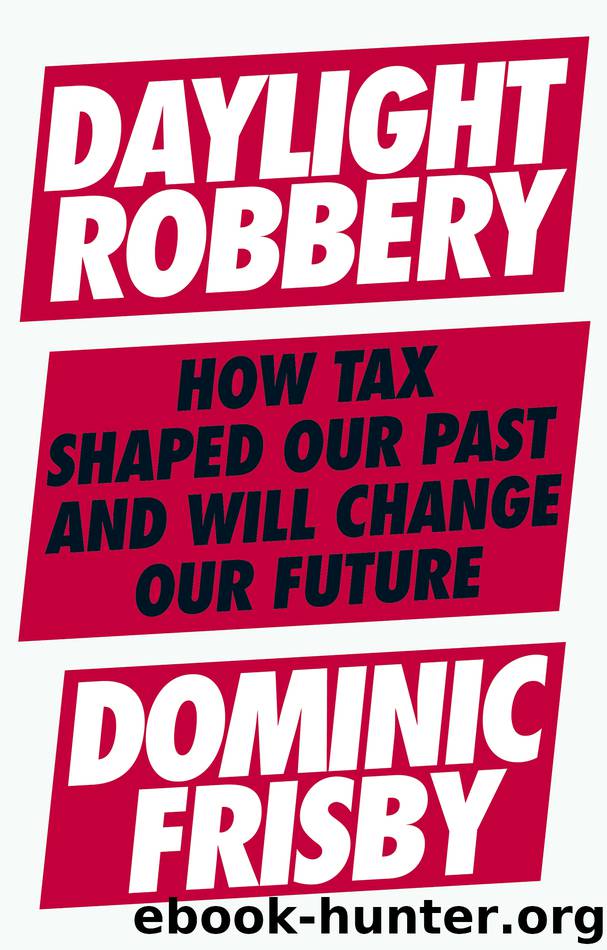Daylight Robbery: How Tax Shaped Our Past and Will Change Our Future by Dominic Frisby

Author:Dominic Frisby
Language: eng
Format: epub
ISBN: 9780241360859
Publisher: Penguin Books Ltd
The inflation tax
For whosoever hath, to him shall be given, and he shall have more abundance: but whosoever hath not, from him shall be taken away even that he hath.
Matthew 13:12
The Renaissance polymath Nicolaus Copernicus called it ‘insidious’7 – insidious because it is ‘hidden’.8 It happens, said Keynes, in a way ‘not one man in a million is able to diagnose’.9 It goes undeclared, unseen and misunderstood.
Yet it is almost as old as money itself, and throughout history, accidentally or otherwise, rulers have resorted to it when their finances are in trouble: in ancient Rome, in the Ottoman Empire, in Robert Mugabe’s Zimbabwe and, though few may understand it, all across the modern world today.
It is inflation.
Like debt, inflation may not be an official tax, but that does not mean it does not exist. Indeed, it is often deliberately propagated, and its effect is the same: it confiscates wealth from one group and transfers it to another – from the salaried or the saver to the state, from creditor to debtor, from employee to employer. It is ‘a particularly vicious form of taxation’, said economist Henry Hazlitt.10 Milton Friedman was equally damning: ‘It is a hidden tax that at first appears painless or even pleasant … It is a tax that can be imposed without specific legislation. It is truly taxation without representation.’11
The modern era is anomalous not just for its extraordinary levels of taxation and debt, but also for its inflation. The twentieth century, says statistician Dr Bryan Taylor, who compiles data for the Global Financial Database, produced more inflation and worse inflation ‘than any other century in history … Every single country in the world suffered.’12 It has continued into the twenty-first.13 Governments inflate when they cannot pay their debt, or, as Friedman observed, ‘to acquire resources to wage war’.14
Inflation is one of those words the meaning of which has been distorted. Often you will hear people arguing on television about whether we are living through inflation or deflation, and the reason their argument is inconclusive is that they mean different things by the word. Today inflation is defined as ‘rising prices’ and deflation ‘falling prices’, but rising and falling prices in what? Central banks mostly ignore inflation in house prices and financial assets in their measures and look at certain consumer prices, which are prone to the deflationary forces of improved productivity.
For the sake of clarity, I stress that I am using the traditional definition of the word: the expansion in the supply of money and credit with the consequence of higher prices. An economist might call it ‘expanding the money supply’ or ‘artificially stimulating credit’; a historian might say ‘debasing money’. Whichever words you care to use, the process is the same.
As financial technology has evolved, so have rulers’ means to debase money and thereby levy the ‘inflation tax’. Roman emperors reduced the amount of gold and silver in coins – so-called coin clipping. Medieval kings did the same. Western European governments went one stage further in 1914 and removed gold and silver from money altogether in order to fund their hostilities.
Download
This site does not store any files on its server. We only index and link to content provided by other sites. Please contact the content providers to delete copyright contents if any and email us, we'll remove relevant links or contents immediately.
International Integration of the Brazilian Economy by Elias C. Grivoyannis(57323)
The Radium Girls by Kate Moore(10907)
Turbulence by E. J. Noyes(7039)
Nudge - Improving Decisions about Health, Wealth, and Happiness by Thaler Sunstein(6633)
The Black Swan by Nassim Nicholas Taleb(6191)
Pioneering Portfolio Management by David F. Swensen(5606)
Rich Dad Poor Dad by Robert T. Kiyosaki(5149)
Zero to One by Peter Thiel(4824)
Man-made Catastrophes and Risk Information Concealment by Dmitry Chernov & Didier Sornette(4736)
Secrecy World by Jake Bernstein(3782)
Millionaire: The Philanderer, Gambler, and Duelist Who Invented Modern Finance by Janet Gleeson(3569)
Skin in the Game by Nassim Nicholas Taleb(3460)
The Age of Surveillance Capitalism by Shoshana Zuboff(3422)
The Money Culture by Michael Lewis(3284)
Skin in the Game: Hidden Asymmetries in Daily Life by Nassim Nicholas Taleb(3264)
Bullshit Jobs by David Graeber(3180)
The Dhandho Investor by Mohnish Pabrai(3168)
The Wisdom of Finance by Mihir Desai(3079)
Blockchain Basics by Daniel Drescher(2891)
